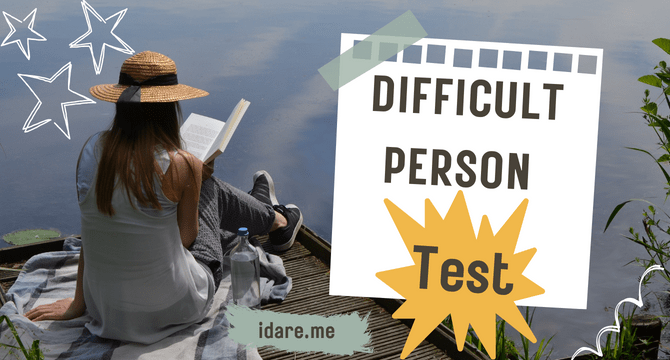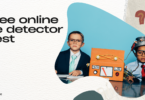Start Quiz
1_ Difficult Person Test
Uncover areas for growth and foster healthier relationships. This self-assessment, often referred to as the difficult person test, delves into seven key personality traits: callousness, grandiosity, aggressiveness, suspicion, manipulativeness, dominance, and risk-taking. By evaluating your tendencies in these areas, you gain valuable insights into how your behavior might impact others and gain valuable pointers for fostering self-awareness and navigating interpersonal interactions more effectively. Remember, understanding your potential blind spots can pave the way for positive change and stronger connections with others.
2_ Understanding Difficult Personalities
Dealing with difficult personalities can be a challenging and often frustrating experience. Whether it’s a co-worker, family member, or friend, navigating these relationships can take a toll on our emotional well-being. To better understand the impact of difficult personalities, it’s essential to delve into what makes someone difficult in the first place.
Difficult personalities can manifest in various ways, such as being overly critical, controlling, or prone to anger outbursts. These traits often stem from deep-rooted insecurities, past traumas, or a lack of self-awareness. It’s important to remember that difficult people are not inherently bad; they simply struggle with managing their emotions and interactions with others.
3_ The Impact of Difficult Personalities on Relationships
Having a relationship with a difficult person can be emotionally draining and have a significant impact on our mental well-being. Constant conflicts, power struggles, and negativity can erode trust and create a toxic environment. Whether it’s a romantic relationship, a friendship, or a professional partnership, the presence of a difficult personality can hinder growth, cooperation, and overall happiness.
Furthermore, dealing with difficult personalities can lead to increased stress levels, anxiety, and even depression. The negative energy and constant tension can seep into other aspects of our lives, affecting our productivity, self-esteem, and overall quality of life. It’s crucial to address these challenges head-on in order to maintain healthy relationships and preserve our own well-being.
4_ Introducing the Difficult Person Test
To better understand and navigate relationships with difficult personalities, one effective tool is the Difficult Person Test. This test is designed to assess and identify the specific traits and behaviors that make someone difficult to deal with. By understanding the underlying causes of difficult behavior, we can develop strategies to cope and communicate more effectively.
The Difficult Person Test consists of a series of questions that delve into different aspects of difficult behavior, such as communication style, emotional regulation, and conflict resolution. It provides valuable insights into the individual’s personality and helps shed light on the root causes of their difficult behavior. This newfound understanding can serve as a foundation for personal growth and relationship improvement.
5_ How Does the Difficult Person Test Work?
The Difficult Person Test operates on the principle that self-awareness is the first step towards change. By answering a series of carefully crafted questions, individuals gain a deeper understanding of their own behaviors and tendencies. The test assesses various dimensions of personality, such as assertiveness, empathy, and emotional intelligence.
The results of the Difficult Person Test provide individuals with a comprehensive profile of their difficult personality traits. This includes insights into their communication style, conflict resolution strategies, and emotional triggers. Armed with this knowledge, individuals can begin to make conscious efforts to improve their interactions and relationships with others.
6_ Benefits of Taking the Difficult Person Test
Taking the Difficult Person Test offers numerous benefits for personal growth and relationship improvement. Firstly, it provides individuals with valuable self-awareness. Understanding one’s own difficult behaviors allows for targeted self-reflection and the opportunity to make positive changes.
Additionally, the Difficult Person Test helps individuals recognize patterns and triggers that contribute to difficult interactions. Armed with this knowledge, individuals can implement strategies to diffuse tension, communicate more effectively, and avoid unnecessary conflicts.
Furthermore, the Difficult Person Test can also improve empathy and understanding towards others. By gaining insights into the behaviors and motivations of difficult personalities, individuals can develop greater compassion and patience, leading to more harmonious and fulfilling relationships.
7_ Applying the Results of the Difficult Person Test
Once armed with the insights gained from the Difficult Person Test, it’s crucial to apply this knowledge to real-life situations. One effective strategy is to practice self-regulation and emotional intelligence. By recognizing and managing one’s own emotions, individuals can prevent escalations and approach difficult situations with a calm and rational mindset.
Another useful technique is active listening and effective communication. Understanding the needs and perspectives of others is key to resolving conflicts and building stronger relationships. By employing active listening techniques, such as paraphrasing and summarizing, individuals can demonstrate empathy and validate the feelings of others.
Additionally, setting boundaries and practicing assertiveness is essential when dealing with difficult personalities. Clearly communicating personal limits and expectations can help establish a healthy dynamic and prevent the exploitation of boundaries. It’s important to remember that asserting oneself does not equate to aggression or disrespect, but rather promotes mutual understanding and respect.
8_ Strategies for Dealing with Difficult Personalities
Dealing with difficult personalities requires a proactive approach and the implementation of effective strategies. One effective technique is to stay calm and composed when faced with challenging situations. Responding with anger or defensiveness can escalate conflicts and hinder productive communication. Taking deep breaths, practicing mindfulness, and utilizing relaxation techniques can help maintain emotional equilibrium.
Another essential strategy is to choose battles wisely. Not every disagreement or conflict needs to be addressed. Prioritizing issues and focusing on those that directly impact the relationship or personal well-being can prevent unnecessary stress and tension.
Additionally, seeking support from trusted individuals can provide valuable perspective and guidance. Sharing experiences and seeking advice from friends, family, or professionals can help validate one’s emotions and provide constructive strategies for managing difficult personalities.
9_ Case Studies: Real-Life Examples of How the Difficult Person Test Transformed Relationships
Real-life examples can illustrate the transformative power of the Difficult Person Test. Take the case of Sarah and David, a married couple struggling with constant arguments and power struggles. After both taking the Difficult Person Test, they gained insights into their communication styles and emotional triggers. This newfound understanding allowed them to implement strategies for active listening, empathy, and assertiveness, leading to a more harmonious and fulfilling marriage.
Another example is Mark, a co-worker known for his hostile and abrasive behavior. After taking the Difficult Person Test, Mark realized the impact of his actions on his professional relationships. Armed with this knowledge, he embarked on a journey of self-improvement, seeking therapy and practicing emotional regulation techniques. Over time, Mark’s relationships with his colleagues improved, and he became an integral part of the team.
10_ Other Resources for Understanding Difficult Personalities
In addition to the Difficult Person Test, there are other valuable resources available for understanding and dealing with difficult personalities. Books such as “Difficult Personalities: A Practical Guide” by Helen McGrath and Hazel Edwards offer comprehensive insights into the different types of difficult personalities and strategies for managing them.
Therapy and counseling can also be instrumental in navigating relationships with difficult personalities. A trained professional can provide guidance, support, and personalized strategies for dealing with specific challenges. Additionally, online forums and support groups offer a space for individuals to share experiences, seek advice, and find solace in knowing they are not alone in their struggles.
11_ Conclusion
Understanding and navigating relationships with difficult personalities is a complex but necessary endeavor. The Difficult Person Test provides valuable insights into the specific traits and behaviors that make someone difficult to deal with. Armed with this knowledge, individuals can implement strategies for self-improvement, effective communication, and conflict resolution.
By taking the Difficult Person Test and applying its results, individuals can transform their relationships from toxic and draining to harmonious and fulfilling. Remember that dealing with difficult personalities requires patience, understanding, and a commitment to personal growth. With the right tools and strategies, it is possible to crack the code of difficult personalities and create healthier, more positive relationships.







